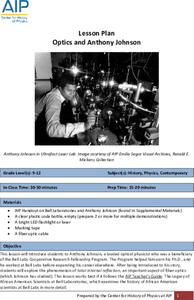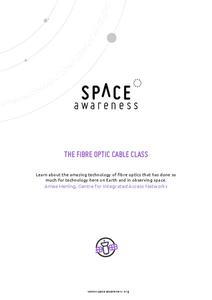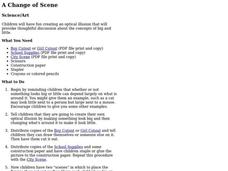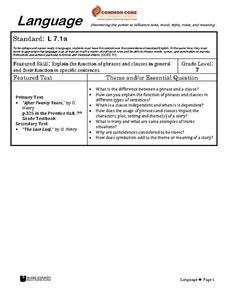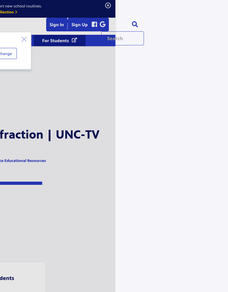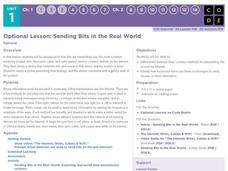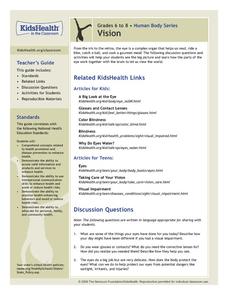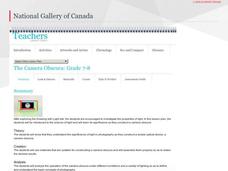American Institute of Physics
Optics and Anthony Johnson
Message sending has come a long way since the days of Morse code's dots and dashes. Young scientists study the research of optical physicist Anthony Johnson and his work in fiber optics, lasers, and the principle of total internal...
Space Awareness
The Fibre Optic Cable Class
Many people know that fiber optics are used in delivering the Internet, but are surprised to learn they are also used in astronomy. Scholars explore light, reflection, and fiber optics through hands-on activities. They discuss methods of...
K20 LEARN
OPTIC - A Reading Strategy Recipe: Visual Literacy
A visual literary lesson provides learners with OPTIC (Observations, Predictions, Themes, Inferences, Conclusions), a reading strategy to help them understand and interpret visual and written texts. Scholars practice the strategy with a...
Curated OER
Online Exploration: Telescopes From the Ground Up
Students explore a web-based illustrated text and interactive graphics to determine the relationship between the operation of telescopes and light. optics. They work in small groups to become an expert on one of the ten eras of telescope...
American Institute of Physics
The Black Scientific Renaissance of the 1970s-90s: African American Scientists at Bell Laboratories
A two-part lesson asks young scientists to research the contributions of African American scientists at Bell Laboratories. After presenting their findings, class members watch two demonstrations that introduce them to total internal...
Curated OER
A Change of Scene
Students create their own optical illusions by making something look big and then changing what's around it to make it look little.
Wake County Public Schools
Language
Have your class doing everything from reading literature, analyzing literary devices, identifying independent and dependent clauses, discussing, and writing creatively with the rich resource found here. After a mini lesson on independent...
National Gallery of Canada
My Upside-Down World!
M.C. Escher is famous for creating optical illusions. Examine this effect in several of his works and discuss the techniques involved. Inspired by the discussion, learners create an imaginary 3-D world inside of a box using various...
PBS
Reflection and Refraction | UNC-TV Science
Uncover the exciting interactions of light energy and matter ranging from color to optical illusions. Participants explore color using red and green apples, differences between reflection and refraction, and descriptions of related...
Curated OER
Hubble Space Telescope Webquest
Middle schoolers research the Hubble Space Telescope. In this Hubble Space Telescope instructional activity, students complete a webquest about the Hubble Space Telescope.
Code.org
Sending Bits in the Real World
A bit optional. How do computers transmit in the real world? Pupils research a device that is used in transmitting bits, then individuals create a poster that presents the information they have learned about their device.
Cornell University
Shedding a "Little" Light on Cancer Surgery
Many types of cancer treatments now depend on nanotechnology—a big "little" discovery. Scholars begin by removing "malignant" tissue from simulated brains, one using fluorescent markers thanks to nanotechnology and one without. This...
Nemours KidsHealth
Vision
From the iris and retina to glasses and contact lenses, learners will be excited to see what activities are in store for them as they learn about the complex organ of the human eye.
University of Minnesota
Welcome To Your Senses
Sound, sight, taste, touch, and smell—oh the world of senses! What do these five senses have to do with the brain? The answer: everything. Explore how the brain sends and receives messages by having the class participate in several sense...
NOAA
A Quest for Anomalies
Sometimes scientists learn more from unexpected findings than from routine analysis! Junior oceanographers dive deep to explore hydrothermal vent communities in the fourth lesson in a series of five. Scholars examine data and look for...
Teach Engineering
Fun With Nanotechnology
Introduce your class to nanotechnology applications with three demonstrations that showcase scientific principles related to ferrofluids, quantum dots, and gold nanoparticles. Groups will work more closely with these applications in the...
National Gallery of Canada
Mastering One-Point Perspective
Cover one-point perspective through observation and practice. Class members examine several works of art that use one-point perspective, look at magazine images to find the vanishing points and horizon lines, and draw their own city...
Art Institute of Chicago
Color Combinations
Explore color through an examination of pointillism and light. Class members view Georges Seraut's famous painting on a computer, zooming in and out to see the details and effects of the technique. They then cover how light and color are...
National Gallery of Canada
The Camera Obscura
You can create a camera with even the most unassuming materials. Learners view photographs and talk about the art. Some background information is included about the camera obscura for you to present before individuals make their own...
NOAA
Biological Oceanographic Investigations – Signals from the Deep
The Deepwater Horizon oil spill directly impacted an area of the Gulf of Mexico the size of Oklahoma. A marine biology lesson plan looks at the impact of an oil spill on the deeper parts of the ocean. Scholars download actual data...
Global Oneness Project
Understanding Blindness
Gaia Squarci's photo essay, Broken Screen, turns viewers attention to the challenges faced by those with visual impairments. After viewing the images, class members discuss why they believe the photographer structured the album as she did.
Curated OER
Lesson 4 Activity 1: Mapping the Third Dimension
Students work in pairs to construct a simple stereoscope.
Curated OER
All Those Seeing Color, Say Eye!
Students discuss feelings and explore how to recognize how they are feeling. In this exploratory lesson students discuss conflict and ways to resolve problems.
Teach Engineering
See the Genes
"If you can't explain it simply, you don't understand it well enough" - Albert Einstein. The sixth installment of a seven-part series teaches young scientists about the importance of being able to communicate scientific research and...
Other popular searches
- Light and Optics
- Fiber Optics
- Vision and Optics
- Bill Nye Light Optics
- Lens Light Optics
- Inquiry Based Physics Optics
- Physics and Optics
- Lenses & Optics
- Sky Optics
- Science, Optics
- Optics, Curved Mirrors
- Optics Flash Animation


